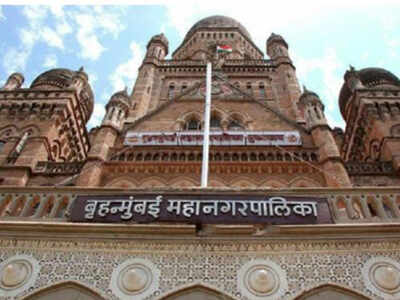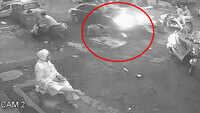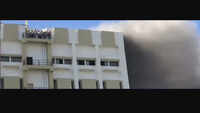
MUMBAI: Days after the Bombay high court halted all work on its ambitious Rs 12,000 crore 30-km Coastal Road project, the Brihanmumbai Municipal Corporation (BMC) filed a special leave petition (SLP) against the judgment that has held as illegal the three Coastal Zone Regulation (CRZ) clearances given in 2017.
The challenge essentially is to an “erroneous finding” by the HC on July 16 that it is not a ‘road project’ but an ‘township and area development’, a classification that thus independently requires mandatory prior environmental clearance (EC) under a 2006 environmental impact assessment (EIA) notification.
The new EC will require a year-long EIA study and report with variable terms of reference and public hearing. The road is proposed from Nariman Point to Kandivli but in two phases, on reclaimed land.
The Supreme Court on Monday agreed to hear the SLP on Thursday after the BMC said its oral plea for a stay was not granted. “Stopping the project work at this stage will cause a significant loss and is not in the public interest," says the BMC’s plea.
Only 20 hectares of the 90 hectares to be reclaimed for coastal road (south) was to be used for the coastal road. The rest is meant for "green spaces for parks, cycle tracks, promenade, butterfly parks, bus depot etc" — a purpose other than the road. "The sheer volume of the area—90 hectare—would require the project activity to be treated as an area development project," the HC had held, but “erronerously" says the BMC.
The BMC plea says the additional large public green open spaces is “only because" the coastal road alignment of 19.3 km including interchanges has to have “gentle curves, not sharp angles". The project plan explains why 90 hectares need to be reclaimed, it says.
It says it “gave undertakings on affidavit to the HC that this open land will not be utilized for development activities (whether commercial or residential) or for any building amenities permissible under the Development Control Regulations but will be preserved for use by the public as open green spaces. This is also a condition of the CRZ Clearance of the MoEF dated 11 May 2017.’’
BMC says the HC’s interpretation of law “is contrary to the law laid down in the ‘Okhla Bird Sanctuary case’ judgment of the SC in 2011". The SC had held that whether a project was governed by a specific entry under the EIA notification was governed by ‘nature of project’ or a “qualitative test" and the project’s nature would be determined by ‘predominant use or nature’ test. The BMC and the state say the predominant use of reclamation is for the road hence it classifies as a road project. “The HC misdirected itself in law in holding that Okhla reveals that “to some extent the quantitative test influences qualitative test”.
A 2015 amendment to a 2011 CRZ notification, the HC had “significantly accepted’’ the BMC points out. It empowers environment ministry to permit land reclamation for road construction in “exceptional circumstances”, which the HC said could mean “cases of extreme hardship or to further public interest or to prevent a greater hardship.”
BMC’s plea is that city’s traffic woes make it an “exceptional case’’ to have a coastal road.
The BMC has questioned the HC also on corals. It says “since inter-tidal waters are not declared as ‘sanctuary’ or national park’, the provisions of Section 39 of the Wildlife Act do not apply".
The HC had held that the project also requires prior clearance under the Wildlife Protection Act and had directed the BMC “not to proceed with any further work relating to the Project without obtaining these permissions.’’
The BMC will argue for a stay to enable work to proceed. It says that its contractors have deployed machinery worth Rs 150 crore and mobilised 1,150 workers, now idling. They have also “already ordered machinery worth Rs 220 crore,’’ and halting work is “causing a loss of approximately Rs. 10 crore per day’’ .
According to the BMC it is a “public infrastructure project of seminal importance which is urgently required’’ as it “envisages a substantial enhancement in the quality of life of millions of citizens of Mumbai and also has a positive effect on the environment.’’
The BMC seeks to rely on the city’s “unique’’ quality of being built on reclaimed lands. It also says that the coastal road proposal has been part of development plan for Mumbai since 1967. The project costs Rs 12,000 crore at present, costs having already escalated. The BMC now says, “Construction of a coastal road on reclaimed land will be cheaper than construction of a sea-link (which will also involve some reclamation) along the same route.’’
In Mumbai where trees are being cut for an expansive Metro rail network, the BMC claims that the project will “result in a 34% fuel saving per day, reduce carbon footprint by about 1826 T CO2 per annum; reduce respiratory disease cases and reduce commuting time by 70%.’’
The challenge essentially is to an “erroneous finding” by the HC on July 16 that it is not a ‘road project’ but an ‘township and area development’, a classification that thus independently requires mandatory prior environmental clearance (EC) under a 2006 environmental impact assessment (EIA) notification.
The new EC will require a year-long EIA study and report with variable terms of reference and public hearing. The road is proposed from Nariman Point to Kandivli but in two phases, on reclaimed land.
The Supreme Court on Monday agreed to hear the SLP on Thursday after the BMC said its oral plea for a stay was not granted. “Stopping the project work at this stage will cause a significant loss and is not in the public interest," says the BMC’s plea.
Only 20 hectares of the 90 hectares to be reclaimed for coastal road (south) was to be used for the coastal road. The rest is meant for "green spaces for parks, cycle tracks, promenade, butterfly parks, bus depot etc" — a purpose other than the road. "The sheer volume of the area—90 hectare—would require the project activity to be treated as an area development project," the HC had held, but “erronerously" says the BMC.
The BMC plea says the additional large public green open spaces is “only because" the coastal road alignment of 19.3 km including interchanges has to have “gentle curves, not sharp angles". The project plan explains why 90 hectares need to be reclaimed, it says.
It says it “gave undertakings on affidavit to the HC that this open land will not be utilized for development activities (whether commercial or residential) or for any building amenities permissible under the Development Control Regulations but will be preserved for use by the public as open green spaces. This is also a condition of the CRZ Clearance of the MoEF dated 11 May 2017.’’
BMC says the HC’s interpretation of law “is contrary to the law laid down in the ‘Okhla Bird Sanctuary case’ judgment of the SC in 2011". The SC had held that whether a project was governed by a specific entry under the EIA notification was governed by ‘nature of project’ or a “qualitative test" and the project’s nature would be determined by ‘predominant use or nature’ test. The BMC and the state say the predominant use of reclamation is for the road hence it classifies as a road project. “The HC misdirected itself in law in holding that Okhla reveals that “to some extent the quantitative test influences qualitative test”.
A 2015 amendment to a 2011 CRZ notification, the HC had “significantly accepted’’ the BMC points out. It empowers environment ministry to permit land reclamation for road construction in “exceptional circumstances”, which the HC said could mean “cases of extreme hardship or to further public interest or to prevent a greater hardship.”
BMC’s plea is that city’s traffic woes make it an “exceptional case’’ to have a coastal road.
The BMC has questioned the HC also on corals. It says “since inter-tidal waters are not declared as ‘sanctuary’ or national park’, the provisions of Section 39 of the Wildlife Act do not apply".
The HC had held that the project also requires prior clearance under the Wildlife Protection Act and had directed the BMC “not to proceed with any further work relating to the Project without obtaining these permissions.’’
The BMC will argue for a stay to enable work to proceed. It says that its contractors have deployed machinery worth Rs 150 crore and mobilised 1,150 workers, now idling. They have also “already ordered machinery worth Rs 220 crore,’’ and halting work is “causing a loss of approximately Rs. 10 crore per day’’ .
According to the BMC it is a “public infrastructure project of seminal importance which is urgently required’’ as it “envisages a substantial enhancement in the quality of life of millions of citizens of Mumbai and also has a positive effect on the environment.’’
The BMC seeks to rely on the city’s “unique’’ quality of being built on reclaimed lands. It also says that the coastal road proposal has been part of development plan for Mumbai since 1967. The project costs Rs 12,000 crore at present, costs having already escalated. The BMC now says, “Construction of a coastal road on reclaimed land will be cheaper than construction of a sea-link (which will also involve some reclamation) along the same route.’’
In Mumbai where trees are being cut for an expansive Metro rail network, the BMC claims that the project will “result in a 34% fuel saving per day, reduce carbon footprint by about 1826 T CO2 per annum; reduce respiratory disease cases and reduce commuting time by 70%.’’
World Cup 2019
Trending Topics
LATEST VIDEOS
More from TOI
Navbharat Times
Featured Today in Travel
Quick Links
Lok Sabha Election Schedule 2019Lok Sabha Election NewsDelhi Capitals teamMI team 2019Rajasthan Royals 2019RCB team 2019Maharashtra Lok Sabha ConstituenciesBJP Candidate ListBJP List 2019 TamilnaduShiv Sena List 2019AP BJP List 2019Mamata BanerjeeBJP List 2019 MaharashtraPriyanka GandhiBJP List 2019 KarnatakaAMMK Candidate List 2019BJP List 2019 WBLok Sabha Elections in Tamil NaduBSP List 2019 UPNews in TamilLok Sabha Poll 2019Satta Matka 2018PM ModiMahagathbandhanNagpur BJP Candidate ListChandrababu NaiduTamil Nadu ElectionsUrmila MatondkarNews in TeluguMadras High CourtTejashwi YadavArvind KejriwalTejasvi SuryaPawan KalyanArvind KejriwalYogi AdityanathJaya PradaSatta King 2019Srinagar encounter
Get the app









